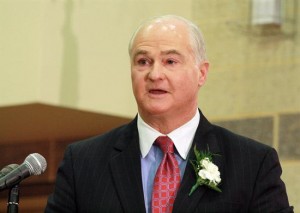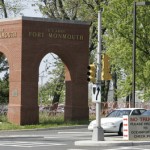Curley: Control of Fort Monmouth should transfer to County, Towns along with the deed
By Monmouth County Freeholder John P. Curley
In 2010, Governor Chris Christie signed into law the Fort Monmouth Revitalization Authority Act therefore, evolving into the Fort Monmouth Revitalization Authority, FMERA. As stated in their annual report, FMERA is to “provide investment continuity and economic growth to the communities impacted by the federal government’s decision to close Fort Monmouth”. The original plan addressed the 1126 acres in Eatontown, Oceanport, and Tinton Falls.
The Monmouth County Improvement Authority will be sanctioned by the Monmouth County Board of Chosen Freeholders to bond 33 million dollars for the Phase II redevelopment effort at Fort Monmouth. This bonding will provide for a direct purchase (transfer) of the remaining 560 acres in the Borough of Oceanport and the Borough of Eatontown, from the Department of the Army to a state created entity, the Fort Monmouth Economic Revitalization Authority, FMERA.
The State is abandoning any financial support of FMERA, leaving the authority void of operating capital; inclusive of the salaries of the ten FMERA employees. Monmouth County is stepping in to ensure the real estate transfer by backing bonding through the highly touted County Triple AAA Bond Rating, placing any potential default on the shoulders of the taxpayers of all 53 municipalities. Should a default take place, this would put the taxpayers in the precarious position of co-signers, land-holders, and bankers. The Government should never put the taxpayers in harm’s way.
This proposal has been labeled as “unprecented” by the members of the Monmouth County Improvement authority because never before has the County backed a bonding proposal that is not secured by tax dollars as the source of funding. Municipalities and School Boards back their bonding obligations through taxation. FMERA has no taxing authority, but is totally dependent on the sale of the 560 acres to raise revenue to meet their operating expenses and bond repayments.
The financial structure of the deal should be revised to include the participating municipalities ensuring equity of financial obligation, and the ultimate say in the decision making process. The stake holders (municipalities) should have the ultimate say in the land use of their communities as designed in their respective master plan.
New Jersey is a home rule state, but the existing FMERA structure does not reflect such. FMERA is presently governed by a thirteen member board. The board includes nine voting members consisting of three public members appointed by the Governor, one ex-officio member of the Executive Branch appointed by the Governor, the mayors of Eatontown, Tinton Falls and Oceanport, one member of the Monmouth County Board of Chosen Freeholders, and the Chair of the Economic Development Authority. The Commissioners of the New Jersey Departments of Labor and Workforce Development, Environmental Protection, Community Affairs and Transportation serves as ex-officio, non-voting members of the board. This board is not structured as a home rule panel, but is dominated by Trenton-gubernatorial appointments- who will no longer provide financial support. It is time to transfer voting power to the County of Monmouth.
With the County now backing the bonds, having only one vote on the FMERA Board, County interests have been more difficult to achieve. The proposed County Route 537 extension will be a key component of circulation with the Fort Monmouth Main Post re-use. It will be a collective roadway which all local roads within the area will connect. These roads include: State Highway 35 and 71, County Route 537, Route 13A, and County Route 11. It will provide an alternate route to all destinations.
Environmental concerns have an enormous impact on the marketability of the remaining 560 acres. The Department of the Army has stated that it will stand behind any necessary remediation when FMERA takes possession. Once ownership is exchanged, the New Jersey Department of Environmental Protection takes precedence in all environmental matters. The NJDEP holds landowners to a much higher standard than does the Department of the Army.
With the state stepping aside from any financial commitment and Monmouth County assuming the mantle of financial responsibility, legislation is mandatory to assure the financial stakeholders, Monmouth County, have the ultimate say in the decision making process. The State of New Jersey has a role at the table; however, Monmouth County and the local municipalities should have the ultimate say.











This sounds like a pitch for aluminum siding.
Once again the taxpayer will be on the hook while developers, one after another, will get a pile of money, deliver nothing and then walk away.
We have seen this time after time